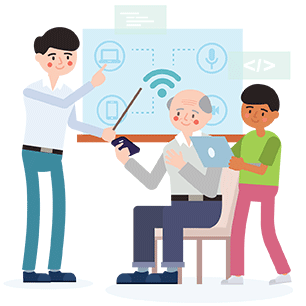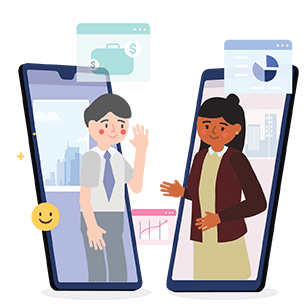Bridging the digital divide

We are concerned that COVID-19 has worsened the digital divide. Lower-income families faced difficulties accessing home-based learning, while vulnerable seniors with limited digital access could not stay socially connected. We are also concerned about those who were laid off due to increasing digitalisation, especially seniors who were less digitally savvy.
We hope that the government, businesses, and the community can work together to identify groups of people who need help with digital access. In particular, the government can facilitate more collaboration across different sectors and partners, to provide more help to those who need it. Agencies could provide technical training and set up support networks for these vulnerable groups, to make using digital tools less daunting. Informal networks of family members and peers are also important sources of help.
We hope that lower-income households can be better equipped for the new age of home-based learning and working from home. We hope they can have subsidised digital devices and WiFi, and gain access to relevant skills and support schemes. Otherwise, we are concerned that the inequality gap will widen.
We hope that seniors and persons with disabilities will not be left out in an increasingly digital society. Other than providing subsidised digital tools and skills training, we feel that government services, such as TraceTogether and SingPass, could be made more user-friendly for seniors and persons with disabilities. Various digital government services could be merged into a single app to minimise confusion. Digital services should include options for larger font sizes and be made available in vernacular languages. Service providers could even use voice recognition to cater to dialect speakers. We think that more seniors and persons with disabilities should be actively engaged to test new digital services and products. We know that some seniors are happy with the ‘Seniors Go Digital’ scheme, and want these efforts to continue and be expanded.
Quotes
Transforming our jobs, businesses and economy

We are concerned about workers whose jobs have been displaced by digitalisation. Certain trades or jobs will be displaced if they do not adapt. Beyond reskilling and channelling these people to other trades, we can also help these affected trades and jobs make the transition to digital platforms.
Some feel that small businesses were hardest hit by COVID-19 as they were least equipped to use digital tools to pivot their business. Business owners also feel that avenues for seeking help are fragmented and complicated. Some businesses cannot afford to take the risk of adopting a digital solution that might not work for them. It would help to have a government portal for businesses to easily access information on digitalisation initiatives and support schemes.
We hope that our society can embrace technology as this can be our economic edge. Singapore should build up our technology ecosystem, groom local talent, attract foreign companies and investors, and position ourselves to share expertise with other countries. We need to stay in touch with global trends, in fields such as digital transformation, gaming and entertainment, and digital health technologies. Schools will need to drive digitalisation, and develop local talent and capabilities in the technology industry. We may need more publicity on success stories of technology adoption.
Quotes
Quotes
Concerns over privacy, cybersecurity and misinformation

Many of us are concerned about privacy and cybersecurity. This has prevented some of us from adopting digital platforms such as e-payments and ordering food online. We hope for a safer internet community. We can also strengthen public-private sector partnerships with telecommunications firms and banks, to educate seniors and less digitally-savvy groups on cyber crimes and online scams.
We also need to combat misinformation and learn from each other, including our youths, how to tell facts and falsehoods apart. One idea was for us to rope in community representatives and form watch groups to dispel fake news that they come across.





























































